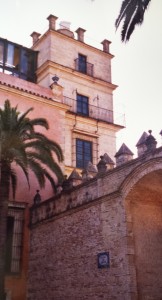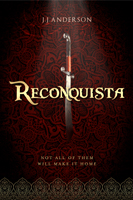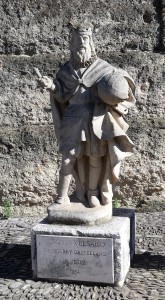 The story of my historical novel Reconquista begins, very specifically, on 9th October, 1264, the day of San Dionisio, patron saint of the city of Jerez de la Frontera. This day is celebrated every year in Jerez as the anniversary of the fall of the city to King Alfonso X and its return to Christendom. The events of this day are the starting point of the novel. From this everything follows.
The story of my historical novel Reconquista begins, very specifically, on 9th October, 1264, the day of San Dionisio, patron saint of the city of Jerez de la Frontera. This day is celebrated every year in Jerez as the anniversary of the fall of the city to King Alfonso X and its return to Christendom. The events of this day are the starting point of the novel. From this everything follows.
I have written before about my researches into the history of that place and the importance of accuracy, not just in terms of the big events – they are well documented – but the smaller details. So, in regard to food, no potatoes. In regard to sea-faring, no telescopes and no galleons, they came later. In regard to social attitudes too – religion was a part of everyday life in a way which it is not for many people now and wars were fought over it.
Imagine my surprise, however, to find that it is not these things which are being questioned by historians, but the big event itself. Miguel Angel Borrego Soto, a Jerez historian, editor of ‘Historia de Jerez‘ magazine and expert on Al Andalus in the Islamic period, claims that this date, 9th October, 1264, which has been celebrated for centuries as the date upon which the city fell, is wrong. ( Spanish speakers might like to read this interview with him here. )
historian, editor of ‘Historia de Jerez‘ magazine and expert on Al Andalus in the Islamic period, claims that this date, 9th October, 1264, which has been celebrated for centuries as the date upon which the city fell, is wrong. ( Spanish speakers might like to read this interview with him here. )
How does an historical novelist cope when the past changes?
Borrego Soto claims that historians have got their saints confused. It is King Alfonso X’s own ‘Cronica‘ or Chronicle which tells us that he finally entered the city of Jerez, after a siege lasting for months, on the day of Saint Denis ( in Spanish, San Dionisio ). Historians have always taken this to mean 9th October, but Borrego Soto argues that the Saint Denis which King Alfonso refers to is St Denis Areopagita, not St Denis of Paris, whose day is 9th October. Saint Denis Areopagita ‘s day is, in fact 3rd October.
A shift of six days isn’t earth-shattering, you say. And yes, although this does make all those celebrations on the wrong day look a little silly, it isn’t too big a deal. But Borrego Soto goes further. He claims that the whole military campaign did not happen in 1264. According to him it happened two  years later, in 1266. King Alfonso, he claimed, didn’t have sufficient funds to mount such a campaign in 1264 and only acquired the necessary money when he received a Papal bull for a crusade, which allowed him to raise money. We know that the Papal bull occurred in 1265. And it was in 1266 that a peace treaty was signed between King Alfonso X and Emir Muhammed I of Granada. These dates fit with Borrego Soto’s theory.
years later, in 1266. King Alfonso, he claimed, didn’t have sufficient funds to mount such a campaign in 1264 and only acquired the necessary money when he received a Papal bull for a crusade, which allowed him to raise money. We know that the Papal bull occurred in 1265. And it was in 1266 that a peace treaty was signed between King Alfonso X and Emir Muhammed I of Granada. These dates fit with Borrego Soto’s theory.
But the theory is just that, at the moment. Many historians reject Borrego Soto’s arguments. The specifics of Alfonso’s ‘Cronica‘ have been subject to interpretation for many years and some historians reject the chronology within it as simply wrong. If Borrego Soto is correct all those Jerezian families and institutions which claim to go back to 1264 will have to re-assess their past. If they were in Jerez in 1264 they may well have been Muslim. More likely their antecedents will have to be shifted forwards by a couple of years. But this is not a small thing.
What is equally interesting for me is Borrego Soto’s view of the relationship between the King and the Emir. Without spoiling the plot of ‘Reconquista‘ for future readers, I find that I have invented a relationship, and events, which I now discover, actually occurred. It’s rather good ( and a bit spooky ) to find that one’s logic, based upon incomplete and necessarily imperfect, historical knowledge, and translated into fiction, turns out to be eerily correct. And both King and Emir lost their thrones within ten years of my story ending.
I wait with interest for the next instalment in this controversy and will report further.
If you enjoyed reading this article you may also enjoy Verano en Jerez The first Library Wanted.. book researcher Provender


 RSS – Posts
RSS – Posts
Pingback: Coming soon Reconquista | reconquista.online
Pingback: Learn more about reconquista.online | reconquista.online
Pingback: Sunshine & flamenco guitar | claphamwriters